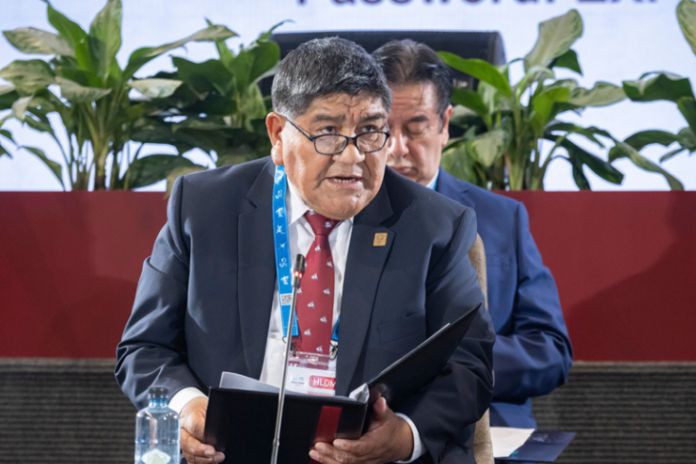LIMA, Peru – Playing a pivotal role in driving the global energy transition, supplying the critical minerals and materials essential for clean energy technologies, officials convened in Lima to reaffirm their commitment to a more sustainable and innovative mining industry.
At the 2024 high-level dialogue on mining chaired by Peru’s minister of energy and mines, Rómulo Mucho, officials discussed key challenges and opportunities in the mining sector, with a particular focus on innovation, inclusivity and the critical role of minerals in a low-carbon future.
“Mining has been an economic cornerstone for Peru and many of the economies represented here,” minister Mucho said. “Throughout history, it has been a driver of growth and development, creating employment, generating tax revenues and significantly contributed to the trade balance.”
“Additionally, mining is crucial in transitioning toward a greener and more sustainable economy by providing essential minerals for clean technologies such as renewable energy and energy mobility,” minister Mucho added.
The mining industry has been in the spotlight in recent years due to its role in providing the essential raw materials required for clean energy technologies such as lithium, cobalt, nickel and rare earth elements that are fundamental for manufacturing batteries, electric vehicles and storage systems.
A key focus of the dialogue was how the mining sector can contribute to the energy transition. As major producers and consumers of these minerals, APEC economies have a unique responsibility to lead global efforts in ensuring a sustainable supply chain for these resources.
Officials shared insights for leveraging science and technology to enhance the efficiency of mining operations while reducing environmental impacts. The discussion underscored the importance of government incentives in encouraging companies to adopt innovative and sustainable practices, which will contribute to a cleaner, safer mining industry.
Minister Mucho also emphasized the significance of promoting sustainable investment, driving innovation in the mining industry and addressing the challenges associated with artisanal and small-scale mining, stressing that these areas are crucial to ensure that the mining industry contributes positively to APEC economies.
Ministers acknowledged the need to integrate artisanal and small-scale miners into the formal economy and explored successful policies that promote corporate social responsibility within the mining industry, particularly in empowering women and engaging local communities.
“As the world moves toward greener economies, mining needs to continue to adapt to the new demand for sustainable practices,” said Dr Rebecca Sta Maria, the executive director of the APEC Secretariat.
“The global mining industry has experienced significant supply chain disruptions in recent years and these disruptions have affected the production and transportation of resources that are essential for industries like renewable energy and digital technologies,” Dr Sta Maria added. “The challenge is ensuring a secure, reliable, and sustainable supply of these resources to fuel the global energy transition.”
“This dialogue provides an invaluable opportunity for APEC to reaffirm its position as a dynamic platform for economies to share experiences, best practices and lessons learned in the mining sector, enabling us to collectively explore ways to maximize the benefits of mining activities while minimizing its environmental and social impacts,” minister Mucho concluded.
“Through cooperation and knowledge exchange, we can tackle global challenge, ensuring that mining positively contributes to sustainable development.”

